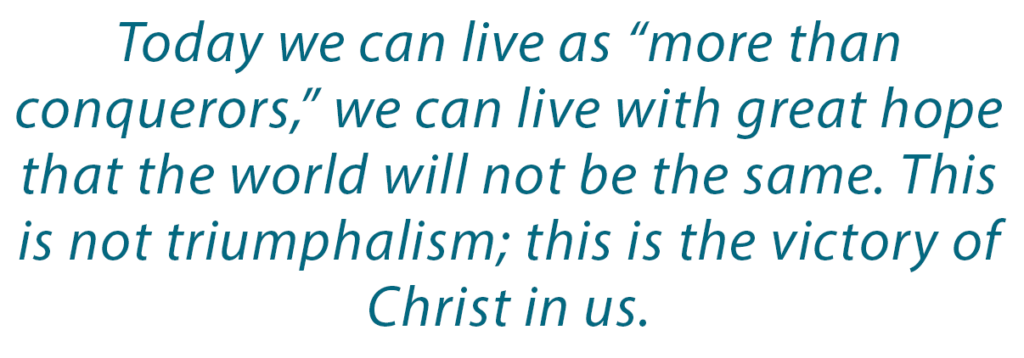Faithful through Hard Seasons: Reflections from an Arab Christian
By Hikmat Kashouh
An abridged excerpt from Following Jesus in Turbulent Times (Langham Global Library), 2018.
It has been said that “a cross-centered gospel requires cross-carrying messengers.”[1] That is certainly what Christ meant when he said, “If anyone would come after me, let him deny himself and take up his cross daily and follow me” (Luke 9:23). . . .
Following Christ is costly. Jesus warned that some would kill us while thinking that they were offering service to God (John 16:33). Persecution is the norm for followers of Christ. The ties between discipleship and persecution are so strong in the Scriptures that it seems unavoidable. This new way of life to which we call people includes a daily invitation to join Christ in carrying the cross. Those who examine the book of Revelation understand that God conquered the world not by sending a lion (as the Jews expected), but by sending a lamb to be slaughtered for the sins of the world.
Experiencing Persecution
When we celebrate incarnational living. . . we should also remember that we need to celebrate incarnational dying as well. Look again at Paul’s great hymn to Christ:
Have this mind among yourselves, which is yours in Christ Jesus, who, though he was in the form of God, did not count equality with God a thing to be grasped, but emptied himself, by taking the form of a servant, being born in the likeness of men. And being found in human form, he humbled himself by becoming obedient to the point of death, even death on a cross. (Phil 2:5–8)
Like him, we are called to follow a path of suffering, humiliation and love. This truth is well known in the Middle East where persecution can come from all directions: from the government, from militant groups, from the extended family, and from a brother or spouse. I recently sat separately with one couple and two individuals who have been following Jesus for more than two years, and they shared with me about their everyday lives. The issue for them was not whether they would suffer persecution, but how they were to manage their lives in the midst of it. Persecution is very real and sadly, their experience is not uncommon among our brothers and sisters. . . Yes, there is plenty of joy and peace in Christ, but, in our region and during the first few centuries of Christianity, it was always coupled with persecution and suffering…
Minimizing Persecution
How do new believers respond to the threat of persecution? How do they respond when they face the threat of losing members of their families, parts of their body, their jobs, friends, place of worship, their home, access to good water and food, and peace of mind?
Our advice is not to promise new believers a life where persecution is absent but to instruct them in how to avoid unnecessary persecution, how to have a long-term impact on their families first and then on their neighborhood, how to stay connected culturally and not to look or sound “weird,” and how to seize every opportunity to share Christ through deeds and words, and not through religiousness. Jesus is welcome in most places in the Arab world. He is the key not only to hearts but to our Arab culture and to different communities.

Leading in a Context of Persecution
Leaders who serve among people of non-Christian backgrounds should not take lightly the cost of serving Christ, especially if they are married and have children. Serving in the Arab world is life-threatening. I do not mean to say that it is life-threatening all the time, but the reality is that it can happen anytime. In Lebanon, we do have a great measure of freedom to share Christ with anyone. This, however, does not prevent persecution from flaring up. We feel safe today, but who knows what tomorrow will bring. As for tomorrow, Jesus said: “So do not worry about tomorrow; for tomorrow will care for itself. Each day has enough trouble of its own” (Matt 6:34 NASB).
Below are a few words of advice to help leaders avoid unnecessary persecution:
• Love the people you meet daily. . .The importance of making friends and building good relationships cannot be stressed enough for anyone who wants to serve in the Arab world. Visiting leaders or missionaries should always work with the local church and shadow local leaders to minimize their own persecution. The locals will understand cultural sensibilities and will be able to identify places of danger that need to be avoided.
• Proclaiming Christ boldly yet gently is always rewarding, even if the results are slow in coming. Polemical approaches that attack other faiths create animosity. . . Almost every Sunday, I stand up in front of my church and remind my congregation about the purpose of what we do every week. I tell them we have no political agenda and are not a militant group; we are a church and our purpose is not to become religious but to follow Jesus more closely. We exist to make disciples. We have found a new way to live our life, a new way to become human, a new path to follow, and this path is to be conformed to the likeness of Jesus. If you want to become like Jesus, you have come to the right place. Differentiate between socio-cultural values and core Christian values. People in our community can still look the same, cook the same food, wear the same clothes, and retain a lot of their cultural norms and values (such as honoring their parents and submitting to one another) without compromising and losing their new identity in Christ…
• Demonstrate care for the whole family. Isolating one individual and sharing Christ with them is not a bad strategy, especially if you are working in a hostile environment. However, we have found that when a leader ministers to and serves the whole family, including the children, a new dynamic emerges…

God’s Vindication
When I quoted Paul’s hymn at the start of this chapter, I deliberately omitted the last verse. But now we need to hear it:
“For this reason also, God highly exalted him, and bestowed on him the name which is above every name, so that at the name of Jesus every knee will bow, of those who are in heaven and on earth and under the earth, and that every tongue will confess that Jesus Christ is Lord, to the glory of God the Father.” (Phil 2:9–11)
Jesus did not stay in the grave, Jesus rose in victory. The path of following Jesus does not end at the tomb, but rather leads through the tomb towards victory. This glorious message should be a daily reality that will be fully realized upon his return.
It is wrong to think that God’s vindication is solely something that will happen in the future. It has already happened on the cross and through the resurrection and ascension of Christ, and it has practical implications in our daily life. . . The forgiveness of sins, peace in the midst of tribulation, boldness to witness in the midst of persecution, courage not to renounce one’s faith in the face of death, acts of kindness and humility in relationships, victory over lustful and selfish ambitions, a forgiving spirit, love for all, including our enemies, miraculous healings of our bodies and souls, freedom from the evil past, self-control, the recovery of our identity, belonging to a family of God that is multi-racial and multi-ethnic, thriving in the Arab world which is predominately Muslim, and having the assurance that eternity is secured by the blood of Christ – these are all marks of vindication in our daily life.
Walking victoriously has a tremendous impact in our region, especially for those who are still rooted in the tribal way of thinking where vindication is the mark of true heroism. No one wants to follow a weak leader who died on the cross and did not rise from the dead. No one wants to follow a defeated person from another tribe. Our victorious life is the key that draws people to Christ.
Today we can live as “more than conquerors,” we can live with great hope that the world will not be the same. This is not triumphalism; this is the victory of Christ in us. . . .
A victorious life is not about what we do; it is about who we are. It is about preserving and cherishing our first love. The deeper our relationship with Christ, the better our understanding of true victory will be. A victorious life is a humble, Christ-honoring, outward-looking, serving life. It is the freedom to choose to walk behind our Master as closely as possible, without the burden of sin, law, fear or death. It is a choice to love him unceasingly, to obey him faithfully, and to serve him at any cost.
With Paul, we say, “For the law of the Spirit of life has set you free in Christ Jesus from the law of sin and death” (Rom 8:2). How thankful we are to God who has given us “the victory through our Lord Jesus Christ” (1 Cor 15:57). So again with Paul we can say, “If then you have been raised with Christ, seek the things that are above, where Christ is, seated at the right hand of God” (Col 3:1), for he “raised us up with him and seated us with him in the heavenly places in Christ Jesus” (Eph 2:6). Finally, the day Jesus promised will come, “when the Son of Man will sit on his glorious throne [and] you who have followed me will also sit on twelve thrones, judging the twelve tribes of Israel” (Matt 19:28).
Hikmat Kashouh, Following Jesus in Turbulent Times (Chapter 14: Suffering) (Langham Global Library), 2018. Used with permission.
Hikmat Kashouh is the senior pastor of Resurrection Church Beirut, a vibrant and growing missional church located in the suburbs of Beirut, Lebanon. Over the last decade, Rev Kashouh has led Resurrection Church through the blessings and challenges of their numerical growth, focusing on disciple-making and serving those in need. Rev Kashouh is involved in Global Kingdom Partnership Network and also has a PhD in Textual Criticism from the University of Birmingham, UK. Before leading Resurrection Church Beirut he was the academic dean at Arab Baptist Theological Seminary, where he still is a research professor. Rev Kashouh is a Langham Scholar and speaks at various conferences in the Arab world and the West. He and his wife Krista have three children, Markus, Betine and Daniella.

[1] Glenn Penner, In the Shadow of the Cross: A Biblical Theology of Persecution and Discipleship (2004), quoted in Don Little, Effective Discipling in Muslim Communities (Downers Grove: InterVarsity Press, 2015), 213.
